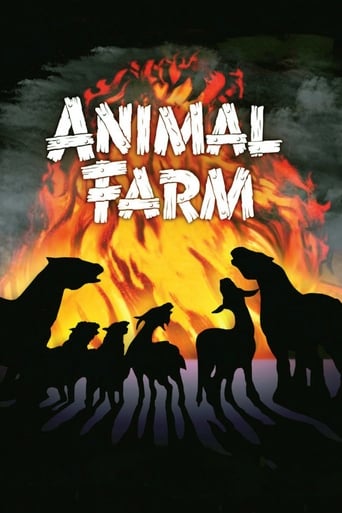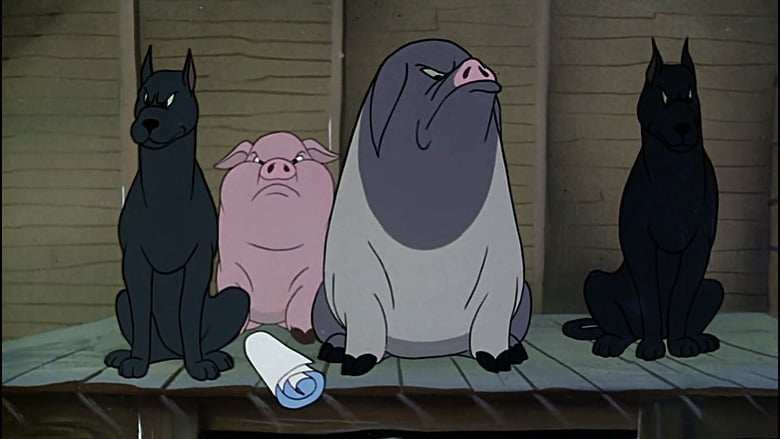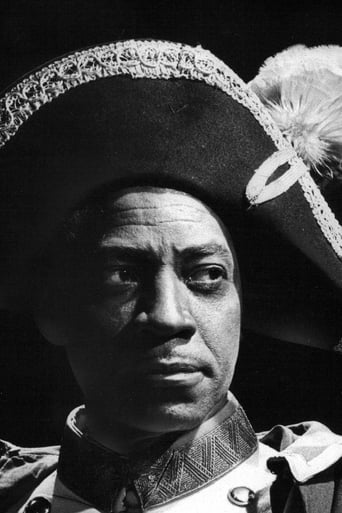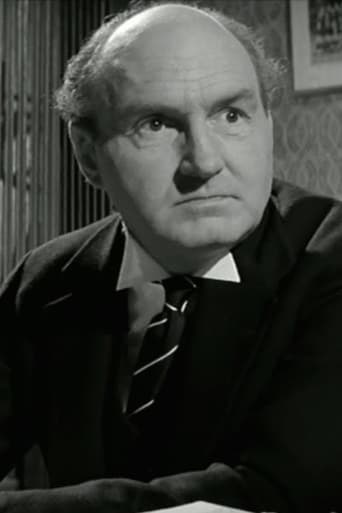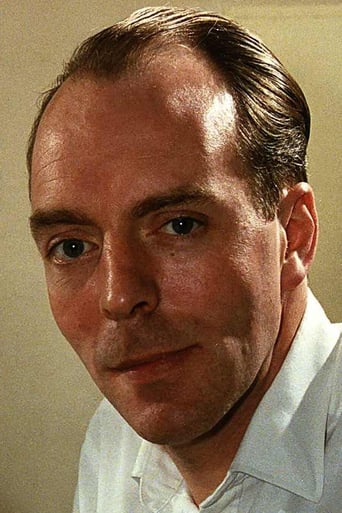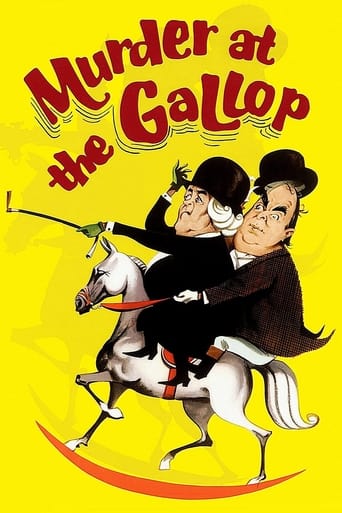Animal Farm (1954)
Animals on a farm lead a revolution against the farmers to put their destiny in their own hands. However this revolution eats their own children and they cannot avoid corruption.
Watch Trailer
Cast
Similar titles


Reviews
I like the storyline of this show,it attract me so much
Thanks for the memories!
Simply Perfect
Ok... Let's be honest. It cannot be the best movie but is quite enjoyable. The movie has the potential to develop a great plot for future movies
This animated feature film of "Animal Farm" is the first version of George Orwell's famous satire book of the same title. It's surprising that it took Hollywood so long to put this story on film. By the late 1940s there could be no doubt anywhere about the Soviet atrocities under Josef Stalin. No sooner had World War II concluded, than the Soviet Union squared off against the Western powers for the start of the Cold War. Still, it took an American CIA initiative to buy the film rights after Orwell died. That led to this film, although for many years thereafter, no one knew that the film was financed by the CIA. By the late 20th century, Orwell's book was considered a classic. Yet it was delayed for publication nearly two years in England and the U.S. because the U.S.S.R. was an ally during World War II. The book's first printing was in mid-August 1945. The war in Europe had ended and that in the Pacific was coming to a close. Orwell embraced public ownership of industry, but under a democratic government, locally elected. He soon split with others on the left when the U.S.S.R. so quickly became a dictatorship. He wrote "Animal Farm" as a satirical example of the totalitarian methods of Stalin's ascension to power. His story shows how easily the masses were manipulated in the Soviet Union. Of course, no country or leader is named in the book, or the film. But the scenes and stages portrayed in the film follow the steps of the U.S.S.R. since its beginning. This animated version set on a farm has animalism in place of communism. The pigs become the Russian leaders who soon and so easily seem to sway the other animals. The film deviates from the book in places. The ending is completely different and has the animals finally revolting against the pigs. While this cartoon rendition can be a good educational tool, it's not something for young children. That's mostly due to some scenes that can be frightening. The portrayals of some characters are quite ugly and the dogs are shown as vicious beasts. This is a film that modern audiences should watch and pay heed to.
The British film industry during the thirties, forties and fifties had a fairly varied output, but there were a few genres in which we were unable, or unwilling, to compete with the Americans. Westerns, of course, were the most obvious example, but we also produced relatively few musicals and, until 1954, no feature-length cartoons, even though Disney had led the way in this area with "Snow White" in 1937 and a number of other countries had followed suit during the intervening period.We eventually broke our duck with "Animal Farm" (and even here we needed some help from across the Atlantic. More of that later). George Orwell's story is too well-known to be set out in any detail. It is essentially an allegory of the Russian Revolution. Inspired by the teachings of a pig named Old Major (Karl Marx) the animals of Manor Farm (the Russian people) rise in revolt against their cruel, drunken and incompetent owner, Mr. Jones (the Tsar). Led by the pigs (the Bolshevik party) they drive Jones from the farm, which they rename "Animal Farm", and proceed to run it on the basis of Major's philosophy of "animalism" (communism). Dissensions arise, however, between the two leading pigs, Snowball (Trotsky) and Napoleon (Stalin). Eventually Snowball is driven out and killed and Napoleon becomes a barnyard dictator. (The allegory is somewhat simplified; there is, for example, no figure who corresponds precisely to Lenin).The style of Halas and Batchelor's animation is quite different from that of a typical Disney cartoon. The animals are drawn in a stylised way, but are far less anthropomorphic than most Disney cartoon animals. Unlike, say, Micky Mouse or Goofy they walk on two legs, not four. The main difference is that their faces are stylised to make it easier for them to express emotions. Whereas Disney cartoons are typically dominated by vivid primary colours, Halas and Batchelor make use of a much more muted palette, especially in depicting the English countryside which forms the backdrop to the action. These differences probably reflect the fact that the film was primarily intended for an adult audience (who would understand the political references) rather than a family one. Indeed, some of the scenes could be quite upsetting for children.The one major discrepancy between the film and Orwell's original story is the ending. Orwell's book ended with Napoleon and his fellow-pigs still firmly in control of the farm, having become virtually indistinguishable from the humans who still run the other farms in the district. In the film, however, the pigs' tyranny and hypocrisy so enrage their fellow-animals that another revolution takes place, led by Benjamin the donkey, and the pigs in their turn are driven from power. (In the book Benjamin is a much more passive, pessimistic character; he can be seen as representing that part of the Russian population which neither actively supported nor actively opposed the Soviet regime). The reason for the change is that the film was funded by the CIA for propaganda reasons; they wanted to see a film which not only criticised Soviet Communism (as Orwell had done) but also predicted its downfall (which he had not).Orwell ended the book on a downbeat note for two reasons. Firstly, he wanted to make the point (as he was to do even more forcefully in "1984") that dictatorships, once established, are not easy to get rid of. Secondly, he was using the book to make a prediction about Stalinist Communism, which he believed would eventually become indistinguishable from capitalism. As regards the Soviet Union, in fact, Orwell was not quite right; it remained an essentially collectivist society rather than a capitalist one until the system collapsed in the early nineties. As regards the other communist superpower, however, Orwell was spot-on, even though Mao's revolution had not yet occurred at the time he wrote the book. In recent years China has transformed itself from a left-wing Marxist dictatorship into a right-wing capitalist one, without a revolution or even a change in the name of the ruling party.Orwell had died before the film was made, so we cannot know what he would have thought of it. My guess is that he would have disliked the change in the ending, which he would have seen as a distortion of his message. Yet in other respects this is a very good film. It is visually attractive, the story is told fluently and clearly and Maurice Denham copes well with the task of providing the voices for all the in the film. I think that Orwell would have liked the film's version of Napoleon, a particularly well-developed character, reducing Stalin from a fearsome dictator to merely the biggest pig in the barnyard. Without the CIA's involvement I might have given the film a nine or even one of my rare tens. It just goes to show that entrusting film-making to intelligence agencies makes about as much sense as entrusting intelligence work to film-makers. 8/10
for a viewer from East Europe, it is not exactly only a good adaptation. it is not just a cartoon. but support for memories. and a warning. the book of George Orwell is always a must re-read. but the movie - piece from the Cold War is little more important than only animation film. convincing, in clothes of children movie, it represents in large measure a bitter parable who has new nuances, special force, more perspectives about the dark frame of dictatorship. in its case, the message is more important than artistic virtues. because it remains a powerful warning. not a decent/admirable adaptation, not an old film. but an useful tool for discover and understand the past and, maybe, for transform the future as better script.
After reading the book, I found this interpretation disappointing to say the least. For example, the animal's singing of "Beasts if England" is disturbing, and Old Major's Death is exceptionally inaccurate. Why, for example, did the producers move the Battle of the Cowshed, representing the Russian Civil War, where the communists reds fought the capitalist whites, to the start of the film! I believe that this was exceptionally close minded of the producers.As my final point, I believe Orwell would turn in his grave upon seeing the historical inaccuracy of the ending. Did he not write the film to warn the public of the dangers of communism, ignorance and apathy! Therefore, I conclude that the film adaptation is disappointing, inaccurate, and lacking in the morale that is so prevalent in the book,
